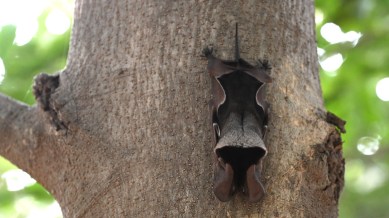Stay updated with the latest - Click here to follow us on Instagram
Wroughton’s free-tailed bat, a highly rare species, spotted in Delhi’s Yamuna Biodiversity Park
Wroughton’s free-tailed bat is ecologically important for regulating insect populations and is also known to assist in pollination.

Wroughton’s free-tailed bat, a highly rare species of molossus bat, has been spotted at the Delhi Development Authority (DDA)’s Yamuna Biodiversity Park, marking a unique sighting.
This bat species is primarily found in the Western Ghats, where there is only one known breeding colony. Small colonies have also been recorded in Jaintia Hills, Meghalaya, and a single individual was noted in Cambodia.
monthly limit of free stories.
with an Express account.
“It is a unique sighting for Delhi, which we found during the routine visit to the corridor of the Yamuna Biodiversity Park,” said Faiyaz A Khudsar, biodiversity expert and incharge scientist under the Biodiversity Parks Programme.
A statement by the DDA Biodiversity Park states that the species is easily recognisable to bat researchers. It is characterised by its large size, huge ears extending beyond the muzzle, and bicoloured velvet fur. The statement added that it typically roosts in caves or dark, damp, and slightly warm places in moderate colonies.
Wroughton’s free-tailed bat is ecologically important for regulating insect populations and is also known to assist in pollination. Until 2000, the species was considered critically endangered because of a single known population in the Western Ghats. Later, with discoveries in three different localities, the bat species was placed on the International Union for Conservation of Nature (IUCN) Red List as data deficient.
According to Khudsar, despite its discovery a century ago, very little is known about the bat’s feeding ecology. The bat species has powerful flying capabilities, allowing it to forage long distances.
The sighting is significant for Delhi because it is known to be home to around 14 species, four of which have been considered locally extinct: the Indian false vampire, the black-bearded tomb bat, the Egyptian free-tailed bat, and the Indian pipistrelle.
According to the statement, “two decades of ecological restoration” have contributed to the establishment of “very specialized niches”. It also noted that the restored forest of the Aravali Biodiversity Park, managed by the DDA, has become the only known roosting site for the Blyth’s horseshoe bat in Delhi.
“…This is a testimony of a long scientific interventions facilitates rewilding of many species reclaiming their historical geographical ranges,” the statement added.